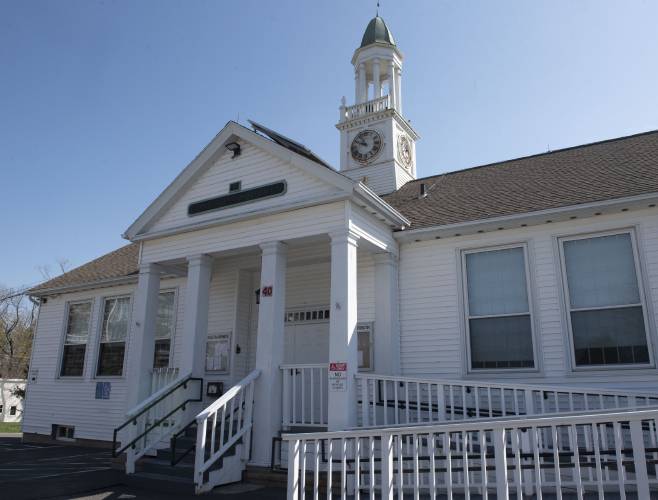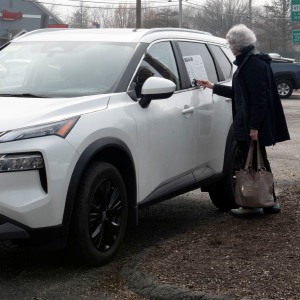Goshen residents support paving town’s dirt roads

Goshen Town Hall
| Published: 11-14-2024 4:09 PM |
GOSHEN — As a study examining the town’s roads takes shape, residents at a Select Board meeting this week said they’d like to see more of the town’s dirt and gravel roads in paved.
More than a third, or 37%, of the town’s roughly 27 miles of roads (excluding state highways) are dirt or gravel surfaces — a reality community members confronted Tuesday by voicing support for increased development of infrastructure through the rural town. Many of those unpaved byways are hilly and winding due to the community’s mountainous terrain at 1,200 feet above sea level.
Select Board Chair Peri Hall said an ongoing study of Goshen’s roads, expected to be completed in the coming months, will provide “a sort of a road map, if you will, or priority planning assistance for the highway department.”
Once complete, the study will give the town an official record on the status of town’s roads, which could be beneficial when filing for grant money. The report will also provide information to help the town prioritize road improvements.
“They’re also doing a culvert inspection ... and they’ll be able to identify priorities for which ones are in need of most attention,” Hall said.
The town’s study, funded through a regional grant from the Pioneer Valley Planning Commission (PVPC), coincides with a regional study of dirt roads being undertaken as part of the commonwealth’s larger goal to develop climate resiliency initiatives, through Municipal Vulnerability Preparedness (MVP) action grants.
The study notes that new state regulations, set forth by the Massachusetts Department of Environmental Protection as part of the state’s Wetlands Protection Act, are to take effect next year, and call for dirt roads to have the same environmental standards as paved ones.
These regulations have yet to be promulgated, but have been recommended in a joint letter by three Western Massachusetts’ Regional Planning Agencies.
Article continues after...
Yesterday's Most Read Articles
The new rules will “impose the most burden on the town,” Hall said, speaking on the pending regulations.
“What that means is that they’re going to start treating them [dirt roads] like impermeable surfaces, like paved roads, for the purposes of watershed runoff, environmental things, culverts, all of that,” she said. “And it’s going to drastically change the way we have to maintain things or inspect things or handle things or handle runoff, or, you know, put in erosion control and things like that.”
Hall hopes that the study will help the town make a case for deferring some of the expensive road infrastructure work.
“What we’re trying to do through this project, through this process, is help us go through some paperwork to get a deferment, like a five-year deferment of having to comply with those regulations when they come out,” she said, and added that PVPC environmental representatives are currently working with the state to “explain to them why this really isn’t a good idea.”
Kyle Citro, among those in attendance at Tuesday’s meeting and who has lived in Cummington for the past 10 years, commented that Goshen has been slow to modernize its streets compared to neighboring communities.
“Cummington has taken down more dirt roads and paved them than I’ve seen in any other town,” he told the board, emphasizing that Cummington’s tax rate is considerably lower than Goshen’s.
“I mean, we see the damage,” he said, speaking about the wear on resident’s vehicles, and adding that dirt roads in town are prone to becoming “dead zones” when mud season comes.
All present, including members of the Select Board, expressed that the condition of the roads also makes plowing extremely difficult, slow, and destructive for plow trucks and equipment.
Despite also being in support of paved roads, Robert Christianson, a Goshen resident and business owner, expressed concern that the town would “turn into Northampton” by introducing a runoff tax to fund expensive infrastructure work.
“They did that in Northampton. They pay for water runoff,” he said, referring to Northampton’s stormwater and flood control fee implemented in 2014.
Kristine Bissell of the board disputed his claim, saying that, “It’s a difference of apples and oranges” between Goshen and Northampton.
“We don’t have the same infrastructure,” she said, highlighting that Goshen is equipped exclusively with well and septic systems, unlike Northampton which has a sewer treatment facility.
Board members briefly discussed their surprise at seeing the overwhelming support for paved roads on Tuesday, and said many community members are frequently in support of seeing their rural roads left intact.
Sam Gelinas can be reached at sgelinas@gazettenet.com.






 Dash to the dealership?: Local consumers, car sellers brace for auto tariffs to kick in Wednesday
Dash to the dealership?: Local consumers, car sellers brace for auto tariffs to kick in Wednesday MTA president offers ways for legislators to address ‘unprecedented dangers’ to K-12 education in state
MTA president offers ways for legislators to address ‘unprecedented dangers’ to K-12 education in state Nearly all of South Hadley High’s student body holds ‘walkout to walk-in’ rally to oppose cuts, call for funding reform
Nearly all of South Hadley High’s student body holds ‘walkout to walk-in’ rally to oppose cuts, call for funding reform ‘Wallace the Brave’ tumbles onto Gazette comics page
‘Wallace the Brave’ tumbles onto Gazette comics page
